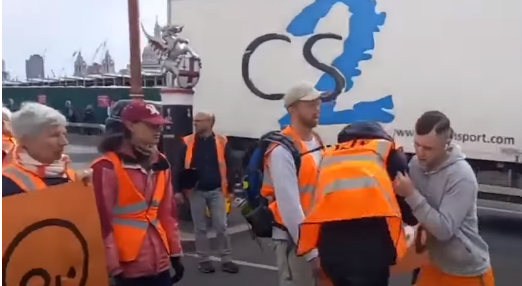‘If the police can’t do their job, then members of the public have to start doing it for them: Man who SHOVED two Just Stop Oil protesters off the road speaks out

In recent times, public frustration has grown towards perceived inefficiencies in law enforcement, raising questions about citizens’ role in ensuring safety and order. One such incident involving Louis Greaves, who took matters into his own hands, shoving two Just Stop Oil protesters off the road, has sparked a nationwide debate.
In this interview, Patrick Christys dives into Greaves’ motivations and sheds light on the sentiments driving individuals to believe they must step in when the police seemingly fail to fulfill their duty.
Patrick Christys: Good day, ladies and gentlemen. Today, I am joined by Louis Greaves, a man who recently made headlines for taking direct action against Just Stop Oil protesters. Louis, thank you for joining us. Could you start by sharing your perspective on why you felt compelled to intervene?
Louis Greaves: Thank you for having me, Patrick. To be honest, it was a culmination of frustration and a sense of helplessness. The Just Stop Oil protests were causing significant disruptions, impeding the flow of traffic, and impacting the livelihoods of countless individuals. The police presence was minimal, seemingly unable or unwilling to address the situation adequately. I, like many others, felt that if the police couldn’t do their job effectively, someone had to step in and restore order.
Patrick Christys: It’s clear that you took matters into your own hands due to the perceived failure of law enforcement. But some argue that vigilantism can lead to chaos and compromise the rule of law. What are your thoughts on this?

Louis Greaves: I understand the concerns regarding vigilantism, and I want to emphasize that I don’t condone violence or unlawful actions. However, there comes a point where citizens feel compelled to protect their community and uphold their rights when they believe law enforcement is falling short. It’s not about taking the law into our own hands, but rather about taking a stand against perceived injustices and disruptions. There must be a balance, but when the scales tip too far, people feel the need to act.
Patrick Christys: That’s an interesting perspective, Louis. However, some argue that such actions can undermine the trust and cooperation between the public and law enforcement agencies. What is your response to those concerns?
Louis Greaves: I fully acknowledge the importance of a harmonious relationship between the public and law enforcement. However, the erosion of trust can also occur when citizens feel their concerns are not adequately addressed. By taking action, we aim to draw attention to the issues at hand, highlighting the urgency for law enforcement to step up and fulfill their duty. It’s not an indictment of all police officers but a call for improvement and accountability.
Patrick Christys: It seems your actions have sparked a larger conversation about the responsibilities of law enforcement and the role of citizens. In your opinion, what can be done to bridge this gap and address the concerns raised by individuals like yourself?
Louis Greaves: It starts with open dialogue and constructive engagement between the public and law enforcement agencies. Citizens must have avenues to voice their concerns, and law enforcement needs to listen and take appropriate action. Additionally, increased police presence during times of civil unrest or protests can help prevent situations from escalating to the point where individuals feel compelled to intervene. Ultimately, it’s about fostering trust, understanding, and cooperation between the two parties.
Patrick Christys: Thank you for sharing your thoughts, Louis. Before we conclude, is there anything else you would like to add on this matter?
Louis Greaves: It’s crucial that we address the underlying issues that lead to public frustration and the perception of law enforcement’s inefficiencies. We need to work towards a system where the police are adequately equipped, trained, and supported to handle situations effectively, preventing the need for citizens to take matters into their own hands.
Moreover, community involvement and cooperation are key. We should strive for stronger community-police partnerships, where citizens actively participate in crime prevention efforts and work alongside law enforcement to maintain safety and order. This could include neighborhood watch programs, community policing initiatives, and opportunities for dialogue and feedback between the public and law enforcement agencies.
It’s also essential for the justice system to be transparent and accountable. When individuals engage in actions like mine, they should be held accountable for any potential violations of the law. At the same time, law enforcement must be accountable for addressing the concerns and grievances of the public in a fair and impartial manner.
Patrick Christys: Thank you, Louis, for sharing your perspective and shedding light on the complexities surrounding this issue. It’s clear that there is a need for a constructive dialogue and collaborative efforts between citizens and law enforcement to ensure a safe and just society. Let’s hope that these conversations lead to positive changes and improvements in our communities.
Louis Greaves: Thank you, Patrick. I appreciate the opportunity to share my thoughts. It is my hope that through these discussions, we can foster a system that truly serves and protects the interests of the public while upholding the rule of law.




